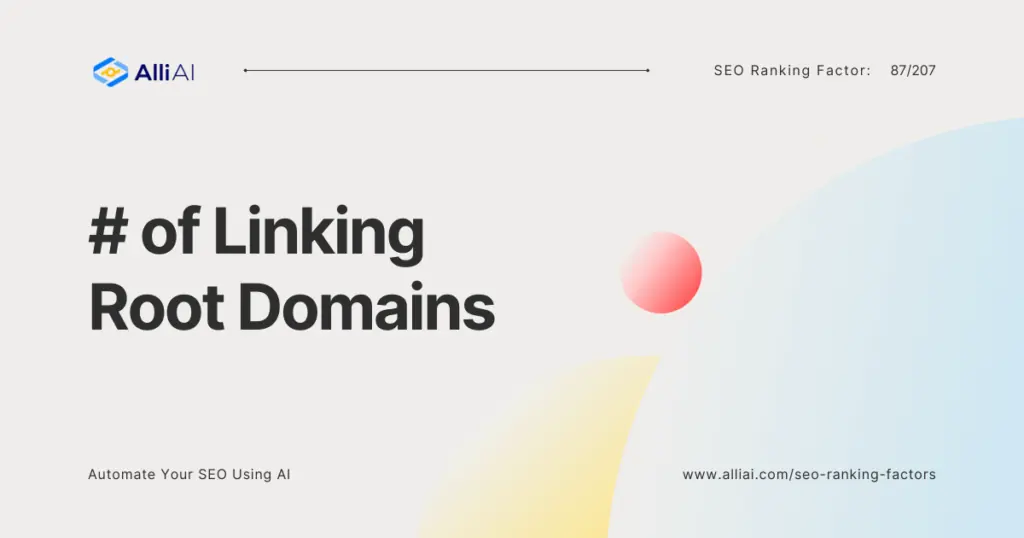What is the Number of Linking Root Domains?
Did you know that the number of unique websites linking to yours is a stronger predictor of your Google ranking than the sheer number of backlinks? It’s a concept that often surprises website owners: It’s not just about how many links you have, but who is linking to you. This is where the metric of “linking root domains” comes into play.
Simply put, linking root domains refer to the number of unique domains that have at least one link pointing to your website. For instance, if you have 10 backlinks, but they all come from different pages of the same website (e.g., example.com), you only have one linking root domain.
Think of it like this: Imagine your website is a rising star musician. Would you rather have one superfan who buys every single one of your albums, or 100 different fans who each buy one album? The latter scenario is far more desirable. It means your music resonates with a wider audience and you’re not relying on a single source of support.
Why is the Number of Linking Root Domains Important in SEO?
The reason why linking root domains are so crucial for SEO lies in how search engines like Google evaluate websites. They use sophisticated algorithms to determine a site’s authority, relevance, and trustworthiness. A diverse range of linking root domains sends powerful signals to these algorithms:
- Trust and Authority: Google views each link from a unique domain as a vote of confidence. The more diverse your “voters” are, the more authoritative and trustworthy your site appears. This is reflected in metrics like Domain Authority (DA) and Page Authority (PA), which significantly influence your rankings.
- Niche Relevance: Links from other websites within your niche or industry carry more weight than generic links. A diverse array of linking root domains within your niche tells Google that you’re a recognized player in your field.
- Algorithm-Proofing: Google’s algorithm updates, particularly the Penguin update, are designed to penalize manipulative link-building tactics. A natural, diverse link profile with a high number of linking root domains is much less likely to trigger these penalties.
How the Number of Linking Root Domains Affects SEO?
Studies have consistently shown a direct correlation between the number of linking root domains and a website’s ranking on SERPs. For instance, a study by Moz found that domains ranking in the top positions of Google search results typically possess links from more unique domains compared to those ranking lower. This highlights the sheer impact of domain diversity on SEO performance. Furthermore, a report by Backlinko reinforced this, demonstrating that the number of linking root domains was one of the best indicators of a page’s success in SERPs. These statistics underscore the indispensable role that a diverse link profile plays in elevating your site’s ranking and visibility online.
Effective Strategies for Increasing Linking Root Domains
To expand your website’s linking root domain count, consider implementing the following tactics:
- Content Marketing: Develop compelling, shareable content that naturally attracts links from various domains.
- Guest Blogging: Contribute guest posts to reputable sites within your industry to secure backlinks from new domains.
- Digital PR: Engage in digital PR campaigns to gain media attention and links from news outlets and industry blogs.
How Can Alli AI Help with the Number of Linking Root Domains?
At Alli AI, we recognize the paramount importance of building a diverse and healthy link profile for your website’s SEO success. To navigate this challenging landscape, we’ve developed Alli AI, a revolutionary tool designed to streamline and optimize your link-building efforts.
- Competitor Analysis: By employing our in-depth competitor analysis feature, you can uncover where your competitors are getting their backlinks from. This insight allows you to target similar domains and potentially acquire new linking root domains for your site.
- Link Opportunity Finder: Alli AI’s intelligent algorithms identify high-authority domains within your niche that are likely to link back to relevant content on your site, thus increasing your number of linking root domains.
- Outreach Automation: Our platform automates the outreach process, making it simpler to connect with domain owners and request backlinks. This efficiency significantly enhances your chances of growing your link profile without the hefty time investment typically associated with manual outreach.
By leveraging Alli AI, you’re not just acquiring backlinks; you’re strategically expanding the diversity of your link profile to significantly boost your SEO rankings.
FAQ
How many linking root domains is considered good?
The ideal number varies by industry, the size of your website, and the competitive landscape. More importantly, focus on steadily increasing the number of high-quality, relevant linking root domains.
Can too many linking root domains be harmful?
As long as the linking domains are reputable and relevant to your content, more linking root domains typically result in better SEO performance. However, an accumulation of links from low-quality or spammy domains can be detrimental.
How can I check the number of linking root domains to my site?
You can use SEO tools like Moz’s Link Explorer, Ahrefs, or Alli AI to analyze your site’s backlink profile, including the number of linking root domains.
Conclusion
The number of linking root domains is a crucial ranking factor in SEO that signals your website’s credibility, authority, and the quality of content to search engines. By prioritizing the growth of your site’s linking root domain count through strategic link-building practices and leveraging powerful tools like Alli AI, you can significantly enhance your online visibility and competitive edge. Remember, in the realm of SEO, diversity isn’t just the spice of life—it’s the very bread and butter of your website’s ranking success.






